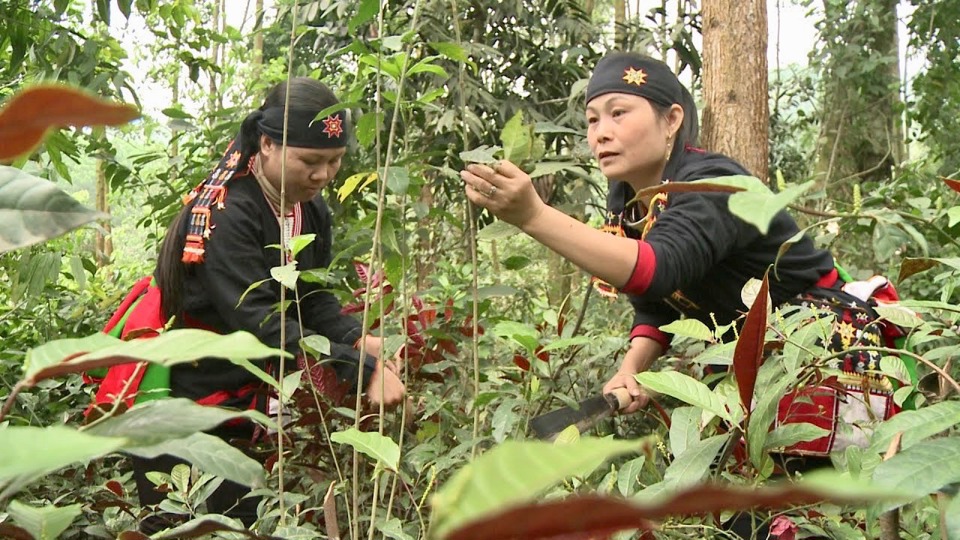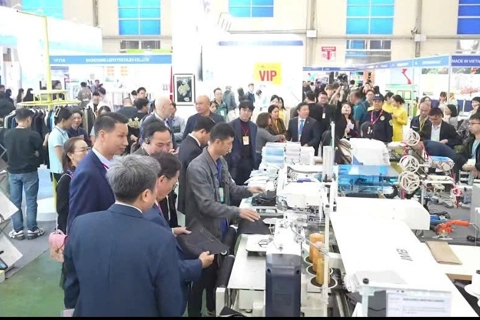Resolution 15 outcomes: Transforming backward ethnic regions (P.4)
Hanoi leads the nation in facilitating socioeconomic growth for ethnic minorities.
The authorities in Hanoi have paid special consideration to improving the living circumstances of ethnic minorities and fostering their socioeconomic growth.
The investment is significant in the city which is home to 50 ethnic minorities living in 13 communes and one village in five districts: Ba Vi, Thach That, Quoc Oai, Chuong My and My Duc. The largest communities are the Muong and Dao.
| Ethnic people take care of herbal plantations in Ba Vi District, Hanoi. Photo: The Hanoi Times |
In August 2008, Hanoi merged with the neighboring province of Ha Tay to its southwest to form a mega-city. As a result, ethnic minorities in the former Ha Tay became citizens of the capital.
Since then, the Hanoi Party Committee has adopted a resolution on the socio-economic development of ethnic minorities in the city, while the Hanoi People's Council has approved several plans to spend hundreds of millions of dollars to develop the mountainous areas.
Under the guidance of the Party Committee and the People's Council, the Hanoi People's Committee has made many detailed plans for comprehensive ethnic socio-economic development.
As a result of these plans, ethnic minorities have enjoyed better roads, more schools and health facilities, and improved infrastructure.
So far, ethnic communes have met the new rural standard criteria, their living conditions have improved, and the rate of poor households in these areas is decreasing in a sustainable way.
"So far, Hanoi has led the nation in improving the living conditions of ethnic minorities," said Hau A Lenh, Minister-Chairman of the Government Committee on Ethnic Minority Affairs.
Fifteen years after the National Assembly's Resolution 15 (on Hanoi's expansion), the living conditions of ethnic minorities have changed significantly.
The success can be attributed to officials who have made special plans, policies, and solutions to suit practical conditions, Lenh said.
"Part of the Vietnamese people, especially ethnic minorities, live in harsh conditions," according to the 13th National Party Congress documents. In Hanoi, the income and wealth gap between those living in the lowlands and ethnic minorities in the mountainous areas is still huge.
Lenh suggested that the Hanoi authorities continue to follow the Party's guidelines and instructions and adopt the government's legal and administrative solutions for ethnic minorities.
He urged the city to remain resilient and strong so that the national socio-economic development plan for ethnic minorities in 2021-2030 will achieve better than expected results.
The minister also called on Hanoi to continue to care for and implement effective policies for ethnic minorities, improve their living standards, and enable them to play a more important role in developing the capital and the country.
In addition, Hanoi should give more thought to urban planning, land management and infrastructure development so that ethnic people can settle down, Lenh said.
"The Committee on Ethnic Minority Affairs believes that the Party Committee and Hanoi authorities will continue to create favorable conditions and enable beneficial activities for ethnic minorities," he said.
"We expect the city to prioritize ethnic people, provide sources to drive their socio-economic development, and help them overcome poverty and become more prosperous."
The Party and the government regard unity among all ethnic groups as a strategic mission for the revolutionary cause, he said.
All government agencies, from central to local, must act to improve infrastructure, develop socio-economic foundations and reduce poverty for ethnic minorities, Lenh said.











